
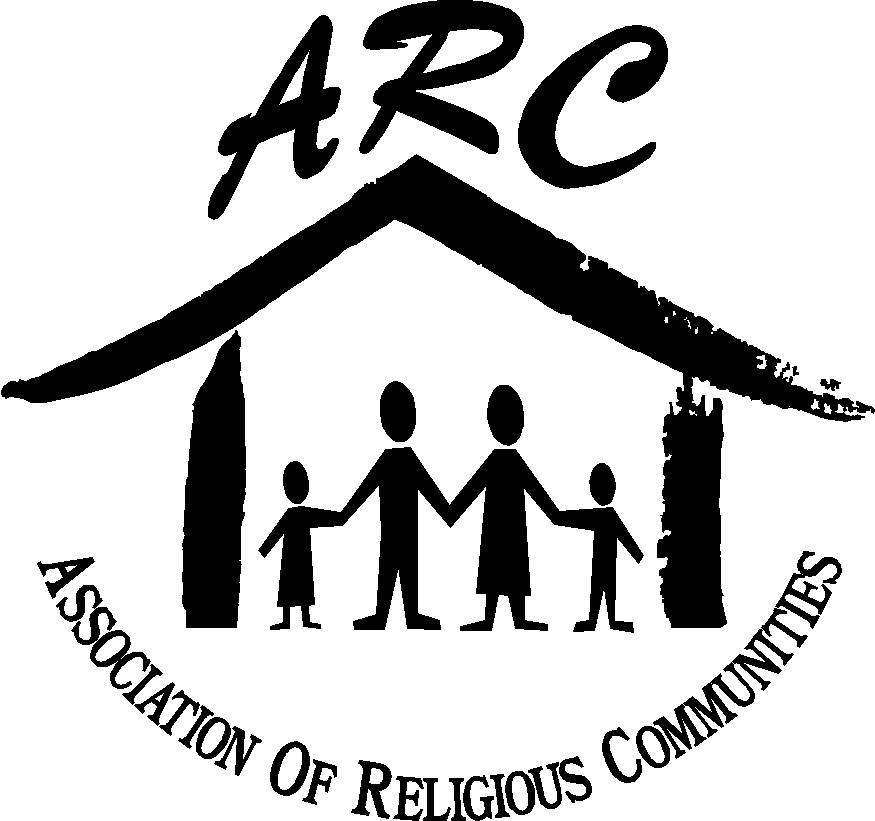
ARC Forum on Faith - Archive 2020


ARC Forum on Faith - Archive 2020
SITE INDEX
Top of Page
The pictures found on this "Forum on Faith" page were either found published
on a web site or provided by the author. If authors prefer to supply a picture instead of the one used,
please send it as an attachment to donlav@eternal-now.org. 

Andrea Gartner
FORUM ON FAITH
Let's let light triumph over darkness.
by Andrea Gartner
Published: December 19, 2020
Danbury News Times
We are at a time where light is triumphing over darkness. It is all around us. And it is hard to ignore during this time of the year.
But it is easy to be distracted! We are pulled by the prospect and the worry of what lies ahead. What is the new bad news of the day? The stresses and losses of 2020 weigh on us and are hard not to think about. But no matter what your spiritual persuasion, now is the time to consider and embrace the darkness that is for the light that will be.
It is the time to acknowledge our lives of plenty during Thanksgiving Day and Dhanu Sankrati. Stand up to the darkness on Diwali and through the eight days of Hannukah and gather with loved ones as we celebrate the birth of Muhammed, Bhagavat Gita, Jesus Christ, and the spiritual practices of Kwanzaa. There is a collective sigh when the nights start getting shorter on Winter Solstice.
As it traditionally has been through the ages (millennia really), - through ritual, liturgy, or celebration - spiritual leaders call upon us these last two months of the year to take time for reflection, introspection, giving thanks, showing gratitude, and practicing faith. There are forces, universal for some, tied to religion for others, bringing us together in Divine unity. For the Eastern Orthodox faithful, this time starts with the Nativity Fast.
Unlike most Christians who celebrate Christmas and four Advent Sundays leading up to December 25th, Orthodox Christians commemorate the six Sundays of Advent which fall in the forty days of the Nativity Fast. Through November 15 to December 24, our observance is one of abstinence and penance, of fasting interspersed with special feast days, to purify both soul and body. The Nativity Fast is not as strict as Great Lent because fish, wine, and oil are permitted on certain feast days during the fast.
Because of its emphasis on repentance, Eastern Orthodox Advent is a season of great seriousness. It is the time to proclaim and glorify the Incarnation of God and enter properly into and partake of the great spiritual reality of Christ's Coming on Christmas. The liturgical services of the season set the stage for reflection and a refocusing of spiritual life. In fasting, we are drawn into humility. We find it in ourselves to forgive our enemies and we become keenly aware of our transgressions.
For nearly thirty years, I have called St. George Antiochian Orthodox Church in Danbury my spiritual family. As a convert and not a cradle Orthodox, it is the pageantry of the liturgy and the rituals that I relish. Over the decades, I found constancy and beauty in that observance and I learned much from it. I admire the elders of the church and the parishioners from the "old country" who accept that the liturgical seasons guide their lives.
But like any family, we can be all in at certain points in our lives and at other times, not so available and maybe we even lose touch. Sometimes, we grow so distant that the gap seems too wide and we might find ourselves in a place of dark disconnect that feels too deep to bridge.
For many, this pandemic year has qualities like our universal end-of-year descent into darkness. Now at the end of a very dark year, advances in technology and science promise us light at the end of the Covid19 tunnel. I am now reconnected to my spiritual family more so than I have been in years because of virtual streaming. Sunday church services are once again a bright light in my week.
We have been reminded since March to take time to reflect, be thankful, show gratitude, and keep the faith during these dark days of Coronavirus. One of the bright lights of 2020 is that we are more prepared to listen to and embrace the annual call of our spiritual leaders during this time. As in any faith, when we listen and open our hearts to spiritual practices, we learn an ideal way of being among our fellow man.
All around, we are giving to those in need, checking in on neighbors, keeping our families' spirits strong - hallmarks of not just the Christian faith but all faiths. These are actions rooted in love, the brightest light of all.
Andrea Gartner, Danbury Democratic Party Chair, St. George Antiochian Church, 125 Kohanza Street, Danbury, CT 06811. Andrea4danbury@gmail.com. (203) 470-8005.
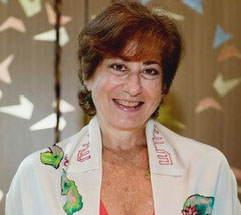
Cantor Harriet Dunkerley
FORUM ON FAITH
Hanukkah celebrates the miracle of light.
by Cantor Harriet Dunkerley
Published: December 5, 2020
Danbury News Times
When I was little, I could not wait for Chanukah to begin! I remember my mother carefully wrapping our gifts and placing them on two separate chairs, one chair for me and one for my brother. This always happened several days before we began lighting the candles - one for each night, adding on until all eight candles plus the helper (the Shamash) burned brightly. We were allowed one present each night, and I remember planning with my brother the order in which we would go through our gifts.
Of course, back then, the true meaning and magic of Chanukah, the Jewish Festival of Lights that falls around this time each year, remained unknown to me. In the Jewish faith, we celebrate Chanukah for 8 nights beginning on the 24th night of the Hebrew month of Kislev. This usually falls somewhere between late November and mid-December depending on how the Hebrew (lunar) calendar, which is what is used to mark all Jewish holidays, lines up with the Gregorian calendar that is commonly used today.
Cantor Harriet Dunkerley, in the Jewish tradition, Chanukah is a minor religious holiday, especially when compared to some of our other Festivals and High Holy Days. Its proximity to Christmas though has lent it ever increasing popularity and contributed to the commercialization of an observance that in truth, is a commemoration of a miracle. Chanukah is also a reminder that no matter how dark things may seem, we must always find ways to bring light into the darkness.
Let us begin with the miracle! According to tradition and to the stories found in Jewish sacred texts, in 165 BCE, Judah and his small band of Maccabees defeated King Antiochus and his large Greek army, rescued the Temple in Jerusalem and rededicated it using the one small vial of pure oil they found. That vial contained only enough oil to burn for one night. Miraculously, it lasted for eight nights, the time it took to press and sanctify more olive oil! That was a big deal because the Temple's eternal flame, once lit, was not ever to be extinguished. And so, an 8-day festival of song, merriment and feasting ensued each year following this miracle at the insistence of Judah Maccabee himself.
Judah and his band of Maccabees did more than kindle, pun intended, a new festival. They brought light back to the Israelites at a very dark time. The 2nd Temple had been looted and defiled, and Judaism had been outlawed. The story of Judah and The Maccabees is a classic triumph of good over evil, of light over darkness, of freedom over oppression. And in today's often divisive and uncertain world, we can all benefit from a reminder that light will always dispel the darkness. The wheel of the year will turn, and the days will once again lengthen as the nights shorten.
In the Jewish faith, this is exactly what Chanukah reminds us each year because it falls during our darkest time. This year, that darkness is compounded by so much - a somber outlook as the Covid-19 pandemic ravages our country, and a news cycle that seems more and more hopeless and grim. I for one, am really looking forward to bringing some light into the world!
Darkness is not just what fills the sky. It can fill our vision too, creating negative thoughts in the mind, and heavy feelings in the heart. What we believe to be true in our minds is linked to how we feel and can define our reality. In Judaism, the lights of Chanukah are like divine sparks that with every kindling help bring light into our thoughts and our hearts. Night by night, candle by candle, we pave the way for expansion, discovery and possibility as we internalize the energy of promise and hope that the Chanukah lights provide.
One Chanukah custom is to put the Chanukiah, the Chanukah Menorah, in the window closest to the street so that anyone who passes might share in the miracle of light. So, as you are walking in your neighborhood between December 10th-17th this year, be on the lookout for small flames dispelling the darkness and welcoming back the light - physically and spiritually. It is there for all to enjoy and share! Chag Urim Sameach! (Happy Festival of Lights!)
Cantor Harriet Dunkerley,Cantor, Educator, Spiritual Leader, Temple B'nai Chaim, 82 Portland Avenue, Georgetown, CT 06828. 203-544-8695. cantorharriet@templebnaichaim.org"
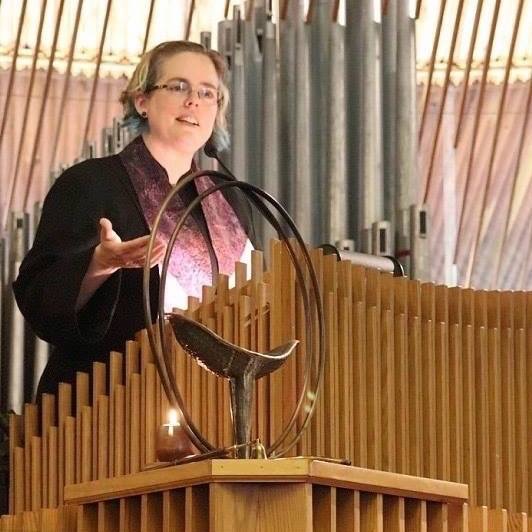
Rev. Heather Rion Starr
FORUM ON FAITH
In troubled times, hold onto core beliefs, values.
by Rev. Heather Rion Starr
Published: November 21, 2020
Danbury News Times
Perhaps at no other time has it mattered so much that we, all at once as a country, from sea to shining sea, cultivate our own clarity of thought and our ability to focus. Core to the Unitarian Universalist faith, in which I have grown up and now serve, is The Free Pulpit.
When I share some of what I hold as core beliefs, values, and even political priorities, to me, I do not expect that everyone who is a part of the congregations that I serve is, or ever will be, in agreement with me on these issues.
Yet it is crucial in these unsettled times that we do - all of us - review our core beliefs and recommit ourselves to the values we hold dear - so that we can maintain both that clarity and our right to take action as we feel moved.
I know I regularly find myself explaining Unitarian Universalism, not as a collection of communities where one can "believe whatever you want,: but instead as a covenanting Association of Congregations in which people are supported in deepening our beliefs within communities which commit to respect each other's differences.
Over almost 17 years of ministry now, I have found myself saying, more often than I would've expected, things like: "You are all welcome here, provided that you can respect that others hold different, equally valid beliefs and perspectives that will likely diverge from yours at some point.
"Everyone is welcome here, as long as you can regularly practice living out the maxim that 'there are many right ways.' This faith is not the right place for you if you believe it's 'my way or the highway.'"
I believe that there is joy and beauty in life to be appreciated every day and that I and we have so much to be grateful for, regardless of what unfolds in our country with each new jarring set of headlines.
Simultaneously, as seminal poet Adrienne Rich proclaimed, the political is so very personal. My love for my spouse and our commitment to each other is no less valid and important than any heterosexual, cisgender couple's commitment to each other. We deserve all the rights and responsibilities of marriage and we take our marriage very seriously - and will continue to expect our government to do so as well.
I also believe that it has got to be a woman's decision whether or not to carry a pregnancy to term in her body. (I feel this only more strongly after having been pregnant at age 37, myself, and as more-and-more research comes out about neural and emotional development in the womb and in the first days and weeks of life outside of the womb.) Forcing women to carry pregnancies to term that they do not want or feel unable to handle is not only cruel to the person with the uterus, it's cruel and potentially permanently damaging to the nascent being forming inside that uterus and the vulnerable newborn once outside.
We preachers are schooled that we cannot lead congregations in campaigning for or against a candidate or an issue during campaign season and then say nothing about that issue when it's not a campaign season. Even though these days it seems like it's always campaign season, still, you get the idea: we need to consistently speak out about how our values inform our views on ongoing moral issues in this country, whether it's welcoming immigrants, protecting reproductive justice, or celebrating marriage equality.
Particularly heartbreaking to me these past four years has been the treatment by the current administration of transgender people. The idea that people I know and love, some of whom present and identify as male with full beards or well-trimmed goatees, could be expected (or even forced, in some states) to use a public women's bathroom because that is the gender identity they were assigned at birth - well, it falls into the category of "unlogic" that one Time magazine journalist found himself confronting around the country in recent months. Illogical and inhumane.
We can, in tumultuous times, lose track of what makes sense, what is elemental to us. I encourage you, reading this, to write down your top priorities for our country, to write down and remind yourself of who you are most dedicated to. What do you want future generations to know that you were committed to during this tumultuous time? Who do you want them to know that you fought and showed up for?
The Rev. Heather Rion Starr is a consulting minister at the Unitarian Universalist Congregation of Danbury. She can be contacted at minister@uudanbury.org; Unitarian Universalist Congregation of Danbury, 24 Clapboard Ridge Road, Danbury, CT 06811.
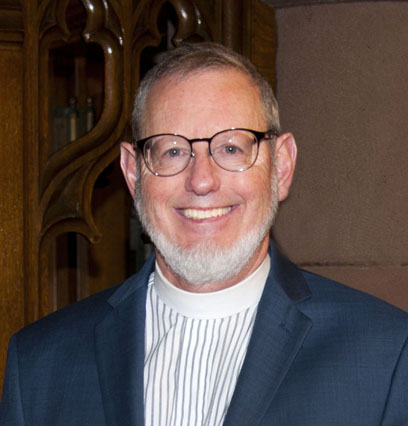
Rev. Dr. James Wheeler
FORUM ON FAITH
Finding God in service.
by Rev. Dr. James Wheeler
Published: November 7, 2020
Danbury News Times
Some of the moments when I have felt closest to God have come not in worship or prayer, but with a crowbar or hammer or paintbrush in my hand. Don't get me wrong, as a pastor for over 40 years I love worship. Prayer is an essential part of my day. I feel close to God in study, on retreat, in fellowship, in giving pastoral care and in many other "spiritual" ways. But I find that there is also something holy in working with my hands and more importantly in working with others in the cause of serving those in need.
I first discovered the spirituality of shared service projects many years ago when I helped lead a youth mission trip co-sponsored by my own and a neighboring parish. It was my first mission trip. We loaded up 5 adults, 16 kids and lots of power tools in 5 cars and drove from Woodbury, Connecticut to Morgantown, West Virginia, where my co-leader had led a number of previous mission trips. Habitat for Humanity in a poor section of Morgantown lined up residents in the hills and hollows who needed repairs to their homes but couldn't afford them. We built a deck, patched up a roof, painted and did minor repairs. Many of the kids and I learned how to use power tools we had never before tried. I learned how to mix cement and level patio stones.
Each night we gathered on the lawn of the parish in whose hall we slept to share ways that God had become real to us in the work we were doing. For many of the kids it was the first time they had witnessed real poverty. Jesus' parable of the sheep and goats tells of people in judgment at the end of time who learn that the ways they either helped or failed to help those most in need, reveal how they treated the King. The kids discovered that in assisting the poor who couldn't afford simple repairs they were helping not only those residents but in a mysterious way they were also helping God. In our evening sharing we talked about how we had encountered God in the fellowship of our work. We found God in the beauty of the West Virginia hills. We found God in prayers for and with the people that we helped. We felt a new companionship with Jesus who was himself a carpenter. I particularly discovered God in the energy and enthusiasm of the kids on the mission trip.
Since then I have led multiple youth mission trips back to Morgantown, in Maine, in Haiti, in Hurricane Katrina ravaged Louisiana and closer to home in Superstorm Sandy battered Staten Island. With fellow adults I have helped build Habitat homes and helped rehab existing homes. Each time has in its own way been a holy moment, an encounter with God.
All world religions encourage service to others as a core expression of their faith. Christians meet Christ in serving those most in need. Jews have an obligation to perform charitable works. Charity is one of the 5 pillars of Islam. Buddhists are enjoined to selfless giving. Hindus are to help others without expecting anything in return. What better way to bring people of faith together than in the service of those in need?
In retirement I have the privilege to serve as volunteer Interfaith Coordinator for Housatonic Habitat for Humanity. My particular goal is to bring people of different faiths to work together to help their neighbors who are in need. In September we had a dozen volunteers for an Interfaith work project in Danbury assisting homeowners who live in a Housatonic Habitat built condo complex to repair their wooden steps and decks. Our next project is tentatively scheduled for Sunday afternoon, January 10 with a snow date of January 24. The work project will be held in a socially distanced safe setting in our large ReStore warehouse. Check out Housatonic Habitat for Humanity's website (www.housatonichabitat.org) for more details.
I encourage you to continue to grow your own faith through worship, prayer and all the formal, spiritual ways that help you connect with the holy. But don't neglect to also look to encounter the holy in the work you do to help folks in need.
The Rev. Dr. James R. Wheeler, Retired Episcopal Priest. He can be reached at: mailto:jrwheeler53@gmail.comp or 203-525-3918.
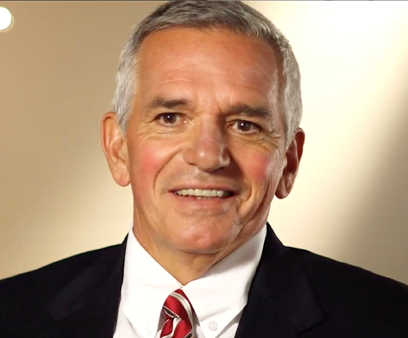
Rev. R. Randy Day
FORUM ON FAITH
Faith and Community.
by Rev. R. Randy Day
Published: October 17, 2020
Danbury News Times
In the rich, 304-year tapestry of esteemed members of the First Congregational Church of New Milford, one person towers over all: Roger Sherman. While his portrait hangs in the Yale Art Gallery, and his impressive biography is featured in books on the Founding Fathers, his spirit lives on in our community.
Following the death of his father in 1741, when Roger was 19, his mother moved the family from Newton, Massachusetts to New Milford, living there until 1761 when he moved his family to New Haven. He was a cobbler, merchant, surveyor, lawyer, justice of the peace, and issued an annual almanac.
The family was devout in the Christian faith. Sherman became a Deacon of the Congregational Church. He also served as the Treasurer of the building committee for a new meeting house on the green. He was very intentional about funding the education of his two younger brothers, both of whom became pastors in Connecticut.
While history books never fail to highlight the significant fact that Sherman signed all four founding documents of our new republic: the Declaration of Independence, the Articles of Association, the Articles of Confederation, and the Constitution as well as authoring the Great Compromise establishing a two-part legislature, we cherish his local church and community dedication and leadership.
From family stories, he knew about the worse smallpox epidemic in Boston in 1721, the year he was born. It was this devastating outbreak that motivated Puritan minister Cotton Mather and Harvard doctor Zabdiel Boylston to variolate hundreds in the initial experiment of inoculation in North America.
Sherman was one of a small circle who succeeded in introducing inoculation to the New Milford community. The disease was greatly feared and considered almost inevitable. Many leading religious voices of the time opposed inoculation, arguing that smallpox, measles and other epidemics afflicted people for a divine reason. To inoculate was to oppose God's will.
Racism kicked in, too. Opposition came from those who pointed to the roots of inoculation being in Africa, Asia and the Middle East and was, therefore, a heathen practice. As a person of faith, Sherman embraced science and advocated for community health. His faith prevented him from being captive to this bigotry dominating some quarters of church thinking at the time.
Today, our congregation gives public health for all persons the highest priority. Wearing masks, social distancing, and other Covid-19 protocols are being strictly followed. Faith and health walk hand in hand.
Saving lives and celebrating life run deeply in most world religions. We turn frequently to what Christians call the two great commandments. Jesus paraphrases the Torah: "You shall love the Lord your God with all your heart, and with all your soul, and with all your mind. You shall love your neighbor as yourself."
Loving your neighbor during a pandemic is a challenge new to most of us. Taking all precautions to protect our family members motivates us to be diligent and alert. Reaching out to the community at large and sustaining our support calls for courage, vision and hope.
We need bridges! Roger Sherman was an early New Milford citizen when the simple wooden bridge washed out more than once during storms. He joined others to have a more substantial bridge built over the Housatonic River. Many in our faith community desire to build bridges over our growing gaps in politics, values, views of science, and any number of social justice issues.
Sherman skillfully broke the deadlock and bridged the critical concerns of the large states and small states during the deliberations of the Constitutional Convention of 1787. His concept of a legislative structure providing each state with equal representation in a Senate and representation based on population in a House of Representatives prevailed. It is known as the Great Compromise or the Connecticut Compromise or the Sherman Compromise.
His experience as a Deacon gave him a fundamental faith in the goodness of all people, enabling him to hear and comprehend opposing viewpoints. I greatly admire this gift of character and have tried to practice it throughout my ministry. I've yet to have a theologically homogeneous congregation. Diversity of thought reigns! This is healthy but does require quiet bridge building in order to prevent fracturing.
Sherman did not own slaves. He did work with the slave-holding states during his political career and this leaves him open to charges of complicity. This is a worthy discussion just beginning to take shape. Faith communities have opportunities to join with academic communities in re-examining colonial history through the lens of racism.
Rev. R. Randy Day, Extended Supply Minister, First Congregational Church of New Milford. 36 Main Street, New Milford, CT. 06776. He can be reached at: rrandyday@gmail.com or 914-299-8492.
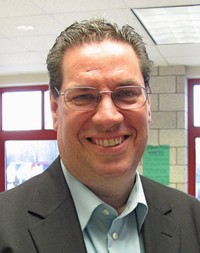
Rev. John Parille
FORUM ON FAITH
Maybe it is time to Change Lanes.
by Rev. John Parille
Published: October 3, 2020
Danbury News Times
Back in June, our church leadership team had one of many Zoom meetings to discuss how we would eventually open the church once we had the "all clear." As we talked it over, it became evident that church may not be quite the same for some time, and perhaps forever.
Things have changed for all of us during the Covid-19 pandemic. Our lives have been turned upside down and the world as we once knew it has changed. Our kids are learning in a whole new way; many are working from home. Families are connecting virtually. There is no doubt, we have all made adjustments.
The question I keep asking, "Is this all bad"? Can something good come out of this? "I say yes! We have an incredible opportunity to branch out, try something new or something you have always wanted to do.
I was inspired when I heard of a young woman in her 20's, after getting her stimulus check for $1,200.00, launched a new online business. In my church there have been many Sundays where we have reached more people through video sermons on YouTube than on a typical pre-Covid Sunday morning.
Many of us, as we travel down this highway of life, will never consider steering into another lane and trying something new. One of the greatest misfortunes in life is to not develop your full God potential. When we won't consider something new, we end up cheating ourselves and the world around us of the wonderful gifts and talents God has given us.
Most times we don't change lanes because we tried something in the past and it did not turn out well. I say to that, "Your potential is not in your past, it is in your future! God has placed a seed of creativity in each and every one of us." Sometimes just a little shift can make a big difference in our lives.
I was reading the book of Isaiah in the Old Testament the other day and found this scripture in verse 60:1 "Arise, shine, for your light has come, and the glory of the Lord rises upon you."
Your light has come! It is time for all of us to arise and shine because our light has come!
But if you seek God's face and bring God into your plans, you don't have to feel confident in order to be confident. The Bible teaches that confidence is found in Jesus Christ and not in ourselves or our abilities. I know I can do nothing without Him that matters, but I have also learned that I can do anything that He leads me to do.
Please understand I'm not suggesting in any way to sell your stuff, buy an old VW bug wagon and drive around the country in tie dyed shirts. Though that actually sounds fun. If you have dreams that you have been kicking around, start praying about them.
Ask God if this is His will for your life, would he begin to open doors of opportunity and give you the courage to step out of your comfort zone.
When you read the Bible, it is clear God loves courage and boldness, and He will usually bless those who have it mightily.
So put your blinker on, check the mirror and begin to make your lane change. See where God may take you in the middle of COVID-19.
Rev. John Parille, Pastor, Bethel United Methodist Church, 141 Greenwood Ave., Bethel CT. pastorjohnparille@gmail.com.
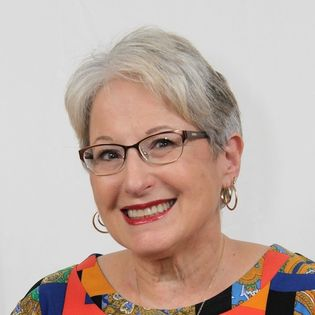
Cantor Penny Kessler
FORUM ON FAITH
Holidays are about becoming our best.
by Cantor Penny Kessler
Published: September 19, 2020
Danbury News Times
When I was a child, Rosh Hashanah meant special foods, new synagogue clothes, and sitting in the synagogue counting the pages in the High Holy Day prayer book, hoping that maybe this year, the services would move faster. Yom Kippur was all of that, minus, of course, the food. As I got older and could understand and personalize some of the High Holy Day prayers, the two holidays took on a different and more meaningful experience.
Today, I understand and teach that Rosh Hashanah and Yom Kippur are an exercise in personal and communal soulful refinement.
Rosh Hashanah, the Jewish New Year, and Yom Kippur, the Day of Atonement, are the bookends of a 10-day period of serious spiritual and moral self-reflection and introspection. "On Rosh Hashanah God's judgment is written, and on Yom Kippur God's judgment is sealed." But, the machzor, the High Holy Day prayerbook, continues, "Prayer, acts of righteousness, and a deliberate return to God can minimize God's potentially harsh decree."
How does this work?
For Jews, prayer isn't just talking to God or asking for things. While there is a lot prayer can do to calm our souls, in Hebrew, prayer is a reflective verb that suggests that when we pray, we are in fact searching our own thoughts and souls so that we can rise from prayer a better person than when we began. Praying to pass a test might make us feel better; praying for the passing grade and coming away from prayer with a resolve to study for the test is what might result in a passing grade.
While righteousness as a value may sound overly pious and pompous, it's actually much more mundane. In Judaism, a righteous act is something one does because one is obligated to do so. It's helping fund a non-profit not just because it makes us feel good (even though it often does), but because we are supposed to do it in order to help make the world a better place.
Finally, returning to God is the equivalent of making a spiritual U-turn. It's a three-pronged process: admit a wrong, apologize to the wronged person, and amend behavior in the future so you don't commit the wrong again. One of the most spiritually unnerving yet spiritually satisfying aspects of returning to God is that we are taught that for wrongs committed against God, Yom Kippur's prayers to God for forgiveness is a possibility. However, for wrongs committed against another person, forgiveness and atonement are only possible by going to that person and upfront admitting, apologizing, and then amending the behavior.
The amazing thing that helps create an aura of expectation and hope is that while each individual does these things on their own, we know that the whole Jewish community is taking part in this process. Our prayer language tells us that this is not just an individual exercise; knowing that we're all going through this process is soul comforting and strengthening.
This year that communal aspect is going to be different. Because of COVID, we can't gather in our brick-and-mortar worship spaces. We are individually and communally going to go through the process. We are going to meet God and each other in any way we can. Some Jewish communities will both meet in secure Zoom rooms and livestream their services on various platforms like Facebook (that's what my synagogue, the United Jewish Center, is doing). Some will just livestream. Some communities will do neither, but they know that they are connected through a powerfully cosmic force over these days.
This year, whether we're in person, in cyberspace, or in our own private spaces, we're going to do the work. And when we come out at the end of the ten days, I believe we will have returned to God and our best selves.
Cantor Penny Kessler, Senior Clergy, United Jewish Center, 141 Deer Hill Avenue, Danbury, 4 CT 06812. She can be reached at: cantor@unitedjewishcenter.org. or 203-748-3355.

Ari Rosenberg
FORUM ON FAITH
White privilege keeps America broken.
by Ari Rosenberg
Published: September 5, 2020
Danbury News Times
Black Lives Matter. Of course, it goes without saying that "all lives matter," but that's the point.
Apparently, in the United States of America, of all places, it does not go without saying that Black Lives Matter. And so, people are going to keep on saying, even shouting, "Black Lives Matter!" until we all recognize the ways in which white privilege has been holding our country back ever since it began, while having catastrophic consequences upon the lives of Americans like George Floyd, Brionna Taylor, and now Jacob Blake, among so many others.
As the new executive director of the Association of Religious Communities, I am proud to be a part of a faith-based nonprofit organization founded under the mission "to alleviate the causes of violence, suffering and hate while advancing Peace, Justice and Human Dignity." Black Lives Matter is in keeping with ARC's support of people of all races, religions, sexual orientations, and countries of origin.
There are several issues with the "all lives matter" reply to Black Lives Matter. First, you can't say you believe all lives matter unless you can demonstrate that commitment to the minorities that collaboratively make up the majority of this country. All lives can't matter unless Black lives matter among them.
Second, it's as though a family goes to a restaurant, and everyone but the daughter is served their meal. When she asks why she didn't get her fair share, she's told that "everyone should get their fair share" (while the people telling her that are the ones who got theirs). Obviously, all she really wanted was her fair share too, just like everyone else. But how is she supposed to get her fair share unless the people who have meals see to it that she gets hers as well?
I don't know anyone who is saying "only" Black Lives Matter. What we're saying is Black Lives Matter "too," not at the exclusion of all lives, but equally and rightfully among them.
Third, there's a difference between equality, equity and reality. Equality is everyone getting the same sandwich, even if the one with peanut allergies can't eat theirs. Equity is everyone getting the meal they need. But the reality is that some people have more food than they will ever need, while others go without, every day.
I see the people who go without, when they come to ARC's Comida food pantry, week after week. I see the people who go without, when they come to ARC to help them get off the street and into safe permanent housing. I see the people who go without, when they come to ARC for financial support to help them through COVID-19 related issues.
I'll tell you what else I see. Although Danbury is over 50 percent white, the vast majority of our neediest neighbors are minorities. It is a privilege not to need the services ARC provides. That privilege comes with a heavy responsibility: To witness the inequity in our society, and to do our part to ensure that everyone has at least what they need, in terms of food, shelter, safety, education, and health care. That's what "all lives matter" really ought to mean.
The fact is that although minorities account for under 25 percent of crimes committed in Connecticut, they amount to almost 75 percent of our prison population.
We know that people of color suffer disproportionately from COVID-19 and other health issues, exacerbated by inadequate access to health care and nutrition. We know that minorities have less access to higher end employment opportunities and other forms of upward mobility. And we know the extent to which police forces across the country have unnecessarily taken the lives of good people who simply did not deserve a death sentence.
To say that something "matters" is to say that it means enough for us to do something about it, if something's not right. Well, something's not right in America right now. The question is, what are you prepared to do about the inherent inequity caused by white privilege in America?
There are many ways to bring about positive change. One is to raise your voice in protest. Another is to provide for those who have suffered the most from the inequities in our society. There are those who can offer financial resources, and others who can offer their time and energy. Join us.
America will remain broken as long as white privilege prevails.
There are things in life that we have no power to control. Collectively, however, we have the power to fix America, and to bring about healing throughout the land, with our words and also our actions, for the sake of all the good people in our country.
Black Lives Matter!
Ari Rosenberg is the Executive Director of the Association of Religious Communities, 24 Delay St., Danbury Ct. 06810. execdir@arcforpeace.org or 203-792-9450.
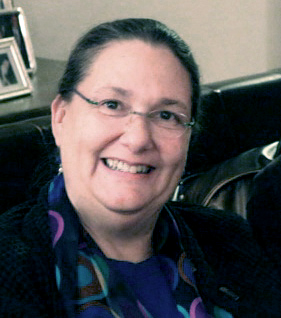
Polly Castor
FORUM ON FAITH
Believing that each of us is made of love.
by Polly Castor
Published: July 18, 2020
Danbury News Times
I appreciate that Christian Science relies on logic, God's goodness, and the of equality of all mankind.
Christian Scientists start with the first chapter of Genesis in the Bible, where God made both male and female in God's own image and likeness, proclaiming each of us to be equally and without exception, "very good."
Logically, we know that a premise follows through into the conclusion. For example, when starting with 2+2=5 , an error will result in the end of your math problem, whereas beginning with the correct math facts will pass through to a correct answer. Christian Science teaches that this same law of logic applies to theology.
Starting out with the first chapter of Genesis, we are God-like, very good, thoroughly known and approved of, expressing and manifesting all the qualities and attributes of God. This dominion and spiritual heritage was bestowed equally, with each of us uniquely needed and treasured, designed to honor God. This premise follows through to a conclusion where we all are inevitably welcomed into heaven, harmony, and joy, leaving no one out.
There is another story of creation in the Bible that starts after that, in the second chapter in Genesis. This second account is the Adam and Eve version of creation, which Christian Scientists take to be a cautionary allegory, and not fact. In this alternative premise, man and woman are not equal and wonderful, but disobedient, ashamed, material, contentious, and blameworthy.
This alternative premise leads to strife of every kind, disappointment, punishment and banishment, followed by death, and even possibly hell. Unfortunately for the peace of our world, this second version has been more universally accepted; we are expected to fail and to fall. Christian Scientists reject that premise in favor of the first.
In the words of Mary Baker Eddy, the movement's founder, "It would be contrary to our highest ideas of God to suppose Him capable of first arranging law and causation so as to bring about certain evil results, and then punishing the helpless victims of His volition for doing what they could not avoid doing."
Christian Scientists start instead with the original, all-good premise, and submit that the world would be as God designed it, if others would as well. What if all of us were individually and collectively endeavoring to express our highest spiritual sense of self all the time, and looked for and upheld each other doing that as well? It is apparent there would be a very different conclusion.
Christian Science defines God as both father and mother, as infinite life, truth and love. That means that each of us is made of love, is lovable, and capable of expressing love. Each of us has an equal part in the benevolent inheritance of infinite, ever-present good. We strive to look to God more than self, and to overcome lower tendencies with God's help.
To do this, Christian Scientists "must renounce aggression, oppression and the pride of power." It may seem like we lose something doing that, but with this first chapter of Genesis premise, there is no envying, dissension, bigotry, superiority or conflict. God has all the power, divine Love meets each of our needs directly, and we all reflect that equally, immersed as we are in impartial good.
This quote by Mary Baker Eddy in her classic book "Science and Health with Key to the Scriptures," sums up the global blessing of this refreshing perspective, "One infinite God, good, unifies men and nations; constitutes the brotherhood of man; ends wars; fulfills the Scripture, Love thy neighbor as thyself;" annihilates pagan and Christian idolatry, -- whatever is wrong in social, civil, criminal, political, and religious codes; equalizes the sexes; annuls the curse on man, and leaves nothing that can sin, suffer, be punished or destroyed.
Christian Scientists earnestly pray for the realization of our God-given goodness and equality. We work for that within ourselves and to have it brought out in all of our dealings. Mutual respect and cooperation, based on how God has made us, in God's own image and likeness, is our standpoint. We celebrate each one's important and blessed inclusion in the human family, all parented well by the one Father/Mother God, who is divine Love.
What premise are you choosing? What result will follow?
Polly Castor is a Christian Science Practitioner, and member of First Church of Christ, Scientist, Ridgefield. She can be reached at PollyCastor@gmail.com.
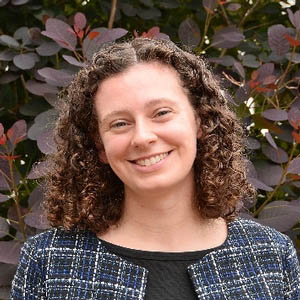
Rev. Jane E. Moran
FORUM ON FAITH
Lessons from the history of Fourth of July.
by Rev. Jane E. Moran
Published: July 4, 2020
Danbury News Times
When the Rev. Henry Wight arrived at the First Congregational Church in Bristol, Rhode Island in 1785, he was a thirty-three year old veteran of the Revolutionary War. His church, which consisted of just thirty-six members, had just built a new building and was looking forward to engaging with the wider community in new ways.
Rev. Wight had a very specific idea for what the First Congregational Church might bring to the town of Bristol. He thought that the community should observe "Patriotic Exercises" on the Fourth of July, and that very year, he initiated the first such celebration.
Strictly speaking, this wasn't the first time that Americans had set the Fourth of July apart for commemoration. Previous celebrations, however, had been small and localized. For whatever reason, it was Rev. Wight's vision for the holiday that caught on and spread across the new country. Bristol, RI became the birthplace of the holiday we now know as Independence Day.
Rev. Wight played the role of "Patriotic Speaker," which involved reading the Declaration of Independence out loud and exhorting the assembled crowd to give thanks for the veterans who won the war and the new nation's freedoms. He would continue to do so for more than forty Fourth of July celebrations to come.
As a minister at a New England Congregational church myself, I was amused when I learned about Rev. Wight's connection to the holiday I grew up celebrating--amused, but not surprised. Congregationalism came to America with the Pilgrims in 1620; you don't have to look very hard to find examples of Congregationalists playing important roles in our nation's history.
Over the course of more than two hundred years, it shouldn't surprise anyone that those roles have been both positive and negative. As Congregationalists, we have much to be proud of, but we also have much for which we should repent. For both purposes, it is necessary to begin by recognizing that our coreligionists have left an indelible mark on American history.
Personally, I think that Rev. Wight is a part of our history we can be proud of, but not only because of his role in establishing Independence Day as a national holiday. On its own, that's nothing but an interesting bit of trivia, but when you look at it in the larger context of Rev. Wight's life, it takes on a deeper meaning.
The more I've learned about Rev. Wight, the more impressed I've been by him. He was not a minister who was content to preach in his church on Sundays, provide pastoral care when necessary, and otherwise remain isolated from the concerns of his community. On the contrary, he sought out a second profession, and became a doctor as well as a minister.
For years, members of the First Congregational Church who fell ill could count on their pastor to bring them both spiritual counsel and medicine. Rev. Wight also believed that his congregation had a religious obligation to help the less fortunate. Bristol's poor knew that they could visit his church and be provided with food and medical services, no questions asked.
Rev. Wight loved his country. That much is clear from his decades-long commitment to leading the people of Bristol, RI in their Fourth of July celebrations. More than that, though, he understood that the love of one's country cannot come before the love of one's neighbor. He showed his regard for his nation by being a staunch advocate for other people in that nation.
This year, Independence Day celebrations will not look like they have in years past. Most local fireworks shows have been cancelled, and social distancing has thrown a wrench into many people's backyard barbeque plans. I'm as sad about this as anyone; pyrotechnical displays and cheeseburgers are dear to my heart.
However, Rev. Wight's story reminds me that Independence Day is about more than just the festivities we've come to associate it with. Anyone can cheer as the night skya lights up in red, white, and blue, but that doesn't actually say very much about whether or not you love your country.
Loving our country is a year-round affair. It requires us to work for the good of all our neighbors--especially our neighbors who are at risk of being left behind. Rev. Wight knew that. This Fourth of July, the lessons of his life are lessons I'll take to heart, and I hope my church and my wider community will as well.
Rev. Jane E. Moran, First Church of Christ, Congregational, 25 Cross Highway, Redding, CT 06896. jane.eliz.moran@gmail.com, (203) 938-2004
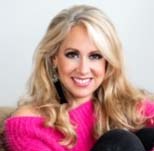
Susan Bawlick Pagen
FORUM ON FAITH
A Father who knows me.
by Susan Bawlick Pagen
Published: June 20, 2020
Danbury News Times
Before the age of 4, I lived with my family of four on a Mink Farm which my father owned and tended. He died of Melanoma when I was 4 and my sister was 7. Although I was very young, I still remember him and have vivid highlighted events in my mind of a time when I was treasured, cherished, and known by my father. I would run into a room and jump onto his lap just to be close to him where I had his full attention.
My sister and I would rummage through the mink farm pushing our doll carriages which held our family cats bundled inside like babies. We sometimes found a baby mink on the ground after it fell through the cage bottoms. We would pick it up gently and carry the tiny life back to our father. We thought he was returning the baby back to the safety of its home and its momma, but in reality those that fell through the bottoms were sick and most likely dead when we found them. He never told us this because he knew us, and he knew how delicate our emotions were in relation to the baby mink.
Isn't that just like a father who knows me, to be mindful of my emotions, and to want to protect me against the reality of certain situations. Though there were times in my life where I felt robbed of growing up without a father, I know that I had a father who knew me while he was here. I also know that I have a Father who has known me and will know me for all eternity.
My relationship with God the Father began to be very important to me as a child. Because I was lacking an earthly father, knowing that God knew me, loved me, and cared for me gave me a sense of security and the feeling of being special & set apart for Him as His treasured child. Going to church and talking to God were natural parts of me that I was never without while growing up.
Reflecting back on times when I just needed to feel special, loved, and known always brings me back to one specific memory. I remember taking my school picture each year . . . . do you remember those small wallet sized photos we would get of ourselves in sheets of about 100 to give out to family and friends?? . . . . i took that photo of myself each year and taped it to the bottom of a painting of Jesus that I had in my room. It symbolized to me that I was part of God's family: my Father, the one who watched over me, cared about me, . . . . the one who knew me.
As an adult I continue to hold on to that inseparable bond with the Father who knows me. I love to go for an early morning run, or a hike, to just breathe in the fresh air while I am surrounded by the glorious nature He has created just for me. He knows I need the refreshment for my spirit, body, and g mind and He places such wondrous gifts in my path at just the right moment.
The importance of a father to a child (and even to adults), especially a little girl, cannot be compared. We all need that sense of belonging,, security, and to be known for who we are. Fathers come in all forms. Mothers can be doing double duty and act as fathers. There are Step-fathers, Foster-fathers, Brothers raising siblings as a father, Uncles, Church elders, close friends of the family, and the list can go on and on. Whoever the "Father" is in one's life, the importance of that title is that you are known by your father whoever that may be. You are KNOWN. The word known means: "have developed a relationship with through spending time with them"
This Father's Day spend time with the one who knows you. Spend time with your Father.
Happy Father's Day to all the Dads in our lives.
Susan Bawlick Pagan, Christian believer currently not with any formal congregation. 203-448-8518, sbpagan@gmail.com
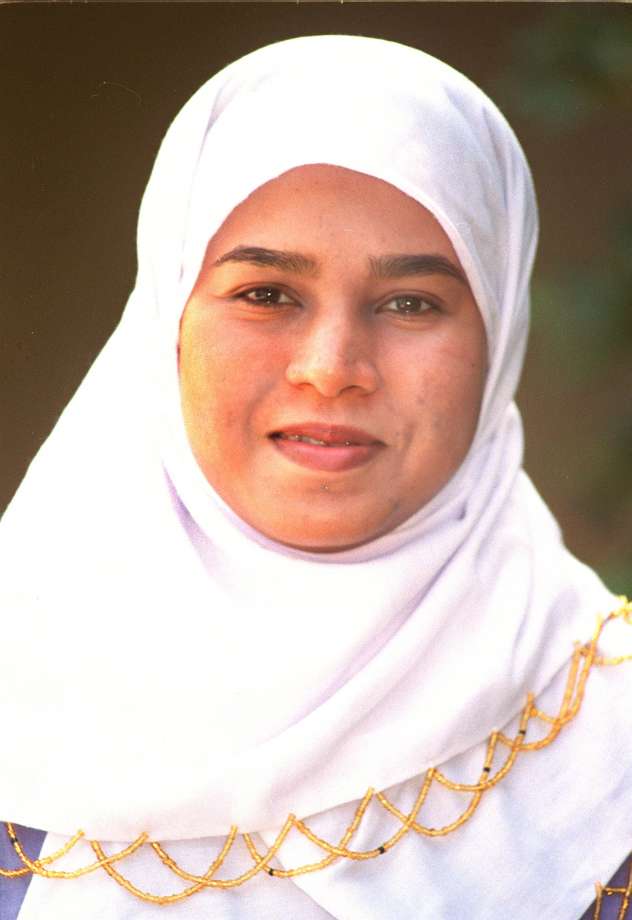
Shazeeda Khan
FORUM ON FAITH
During difficulties, God is rooting for us to succeed.
by Shazeeda Khan
Published: June 6, 2020
Danbury News Times
The psychological effects resulting from the COVID-19 pandemic are both jarring and visceral. Maintaining hope is vital. For Muslims, hope is grounded on the belief that God's promise is true.
God says, "Indeed, there is ease with hardship. Most certainly, there is ease with hardship" Quran 94:5-6. That is to say, God has combined ease with adversities. Understanding this can transform our mindset. Adversities not only come to an end, but God provides support during these situations. Further, the Most Merciful promises that He will not give anyone a burden that they are unable to bear, Quran 2:286.
Experiencing Ramadan during this pandemic was a blessing because fasting brings our relationship with God to the forefront. It reminds us that God is in control; He has a plan and He is the best of planners.
Ramadan is a month of manifold blessings, where abstinence from food, drink and intimate relations from dawn to sunset exposes our strength of resolve. Where recitation and contemplation of the Quran fortifies our belief in the One God. Where the supplemental prayers cultivate patience and repentance. Where our egos are humbled. Where the human capacity for submission prevails over its desires. Where quarantine offers opportunities for introspection and time for sincerity in our supplications to God - that He forgives us, accepts our efforts, bless us with another Ramadan. We ask for the sick to be healed, and for those who have passed to be in peace. We asked for the protection of our neighbors and their families, and an end to this pandemic.
In this world we will face tests. God says, "Do the people think that they will be left to say, "We believe" and they will not be tried?" Quran 29:2. Tests expose our depth of submission to God. There is a saying of the Prophet (with peace) that explains the two types of tests, along with their solutions, which is meant to alleviates worries and stress. He said when believers are tested with prosperity and ease, they should express gratitude to God and that will benefit them. When they are tested with adversities and difficulties, they should endure with patience and that will benefit them.
Consequently, Muslims live between two states - gratefulness and patience.
Of these two types of tests, gratefulness to God is probably more difficult because God bestowing His blessings and mercy upon us may veil us from our need of Him. We may think that we deserve these blessings or they are a result of our own talents, which is ungratefulness.
However, during times of adversity there is the potential of strengthening our relationship with God through exhibiting patience. During such times, we turn to prayer. Praying is choosing to return to God and that is patience. Patience is exercising self-restraint and practicing forbearance and endurance.
Patience is also to put forth effort to seek permissible ways out of difficulties, knowing that nothing happens without the Will and Knowledge of God.
The Prophet (with peace) said, "There is no disease that God has created, except that He also has created its treatment or cure." Thus, we pursue a cure and that is patience. In the meantime, we take the precautions recommended by doctors and medical experts while we put our trust in God, and that is patience.
We are told that wearing masks is the most effective way to stop the spread of the virus. I protect you by wearing mask, and you protect me by wearing a mask. This demonstrates love and care for one another. The Prophet (with peace) said, "None of you will believe until you love for your brother what you love for yourself." We are in this together.
During difficulties, we find solace in knowing that God is rooting for us to succeed and in turning to Him we find comfort. God describes Himself through 99 Names and Attributes. Consider a few - Al-Fattah; the one who opens doors to sustenance, solves problems, and brings ease. Ar-Razzaq; the sustainer and provider. Al-Wahhaab; He is immensely generous to all His creations through guidance, substance, and cures from diseases. Al-Jabbaar; the healer of the broken-hearted, the one who brings comfort to the weak, and to those who turn to Him, and to those seek His refuge. God is the one who enforces His Will without opposition; He is able to do all things. The two most repeated Attributes of God in the Quran are Ar-Rahman and Ar-Raheem, the Most Merciful and the Mercy Giving.
Shazeeda Khan is a teacher and Director of Islamic Education at Baitul Mukarram Masjid of Greater Danbury, 330 Main Street, Danbury CT. shazeedak@charter.net.
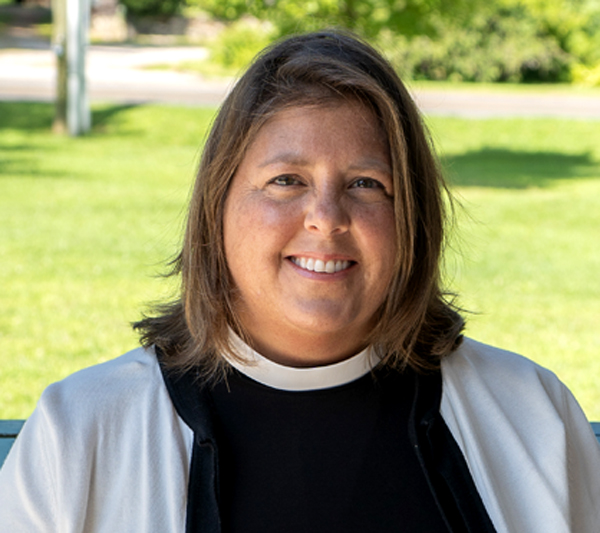
Rev. Beth Anderson
FORUM ON FAITH
Much like the Reformation, we are in a time of rapid change.
by Rev. Beth Anderson
Published: May 16, 2020
Danbury News Times
"My dear people," Kurt Hendel would address his students in seminary class when beginning a lecture on the theology of Martin Luther and other 16th century reformers. That address echoes in my memory of him standing before us in a small trim frame, confident stature, and a focused gaze upon his dear people. He spoke to us about matters of God, world history, church history, and human relationship with the divine. He reminded us daily, that we are dear people, not only to him, but that we most certainly are God's dear people.
Martin Luther, a Roman Catholic monk in Germany, is perhaps most remembered for nailing 95 Theses to the Wittenberg Castle Church door October 31, 1517. This began public debate surrounding the sale of indulgences for the forgiveness of sin. Martin Luther's study of scripture led him to question some of the church's practices, not for argument's sake, but in search for genuine relationship with God.
Revolutionary inventions contributed to major shifts in society and religious life. The printing press was operating in Germany, thanks to Gutenberg. Martin Luther translated the Bible into the common German vernacular. He also wrote a small pamphlet called the Small Catechism. The printing press made it possible for Luther's translations to be placed in the hands of average citizens. No longer would Scripture be reserved only for the well-educated priests and professors. Scripture became accessible for many. One could read God's word and hear for themselves the stories of God's love for the world.
Martin Luther and other reformers gave people access to reading and interpreting God's word. This was a powerful shift in the life of the church. Religious leaders would begin to be held accountable for their interpretations of scripture and misuse of power. Churches, like all institutions can be broken, sinful, and hurtful. Our religious communities also bring about God's healing, forgiveness, and grace.
While shifts were happening in churches, changes were also happening in homes. Luther believed it important to practice our faith at home, work, and all spheres of daily life. God is not only to be found in the church building, but in every human being. Luther called this the priesthood of all believers. God works through us in our everyday relationships, work, and play.
Currently, we are in the season of Easter which begins on Resurrection Sunday and lasts 50 days. The season of celebrating God's life-saving power over death coincides this year with an historic pandemic. Instead of glorious celebrations in our church buildings with robust music and singing, we've reformed our faith practices. Our homes and walking paths have become centers of faith and spirituality. I have witnessed a deepening of people's communion with God and with one another while our buildings are closed. During the season in which God's story of life being more powerful than death, God promises renewed life even in the midst of this pandemic.
I miss joining our voices in song and prayer, being in the presence of one another at our beloved church. Nothing adequately replaces in-person gatherings with our Sunday school children and Confirmation class. I miss learning together in our classrooms. And yet, our physical separation has led us to find new ways to communicate. We have discovered a desire for exploring and sharing our faith in ways that previously were taken for granted. We are meeting a God who indeed is alive and working through us at a time of great uncertainty, fear, and stress.
Much like the reformation of the 16th century, we are in in a time of rapid change. Renewal is happening in our world and in our church. We search for meaning, finding purpose, and turn to God for guidance. Church is not a place, but a people. My prayer is that all may know deeply that we are truly God's dear people and God entrusts us with the work of caring for this world.
The Rev. Beth Anderson, Pastor, St. Andrew's Lutheran Church, 6 Ivy Hill Road, Ridgefield, CT 06877. 203-438-0606, pastorbethanderson@gmail.com.
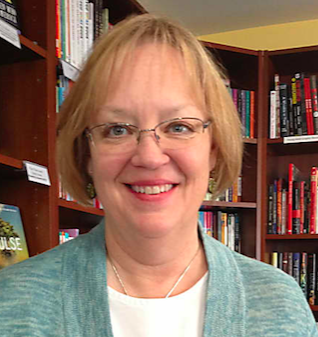
Alice Hutchinson
FORUM ON FAITH
Finding joy in the background noise during Lent.
by Alice Hutchinson
Published: May 2, 2020
Danbury News Times
This year, I entered into the Eastern Orthodox Lenten season with my fellow Christians and a feeling that this was going to be a different experience. Lent has a familiar structure and rhythm that is constant and familiar for most of us in the Orthodox faith that ties us to an ancient legacy. But sheltering at home due to a global pandemic had a different feel.
I have followed all the secular guidelines: distance, mask, gloves and supplies prepared. I surrendered my mobility and potentially my little bookstore. My church reminded me to pray more often. I searched my soul, gave up foods, contributed to a few charities and tended to friends by reaching out by phone more often. Lent lasts for 50 days ending with Pascha (Easter). Eastern Orthodox Pascha is a different date than western Easter - sometimes. It is simply: our Easter has to be after Passover- so this year it was April 19th.
In our faith we begin the Paschal service a little before midnight. It includes the psalms and special music with a procession outdoors where we repeatedly sing, "Oh Christ Our Savior, the angels in Heaven sing, enable us on earth to glorify You in purity of heart". We reenter the chapel and sing glorious music and have a service that includes communion, all sung or chanted, until very early in the morning. Matins, the Hours and Divine Liturgy combined are usually about three to four hours, all standing. Our church traditionally gathers the next day for a feast-filled pot luck meal where we celebrate the joy of the day together with family and friends.
As you can well imagine, all of that was different this year. Since we were all confined to home, Metropolitan Tikhon, the head of our church, conducted services at a monastery in Pennsylvania with the monks. Across the country many of our faith tuned in to listen to our services conducted for our benefit by those who choose to live away from the world. What a different experience to have those who have renounced a secular life provide a high holy feast for upwards of 700 on a live video feed in the middle of the night. It was a genuine gift.
Ok, the austerity and sacrifice are over, and I am ready to move on. But the pandemic didn't move on, and I was stuck in a perpetual Lent. Or was I? Did I spend 50 days thinking that Lent was defined by quarantine? Did I assume the seclusion and the austerity of social distancing would end with Pascha? I think I did.
If that is the case, did I miss the nature of Lent and the interior work asked of me by my church? Without the buzz of the daily grind I assumed it would be easier to mine the depths of faith for a time, then I could go back to the world as it was. The "before" was marked by Lent, the "after" is marked by an unknown.
I am taught the true nature of Lent is to bring us closer to God, to strip away the "things of the world" in order to dig deep. What I realized is that I had discovered a joyfulness in the very small things that used to be part of the background noise of the day.
I notice the Bethel Garden club donned masks to plant flowers in front of my store, the dog-walkers wave as they passed by, the UPS driver warms with a kind word, the taste of my morning coffee, warm laundry, curbside dinner pick-up, church bells downtown tolling the hours with a hymn at noon - each have become precious.
I have been given the map of what sacrifice looks like from my Christian faith. The "still small voice" is a little easier to hear in the quiet, when I listen, and I am finding it more deeply in those small things. I have been asked to pray in the face of crisis - remembering that I have been taught that all I have to do is ask.
Learning to listen is the work I need to continue as part of life "after". Remember me, O Lord, in Thy kingdom.
Alice Hutchinson, Member of Saints Peter and Paul Eastern Orthodox Church, 93 Dodgingtown Rd/P.O. Box 84, Bethel, Connecticut 06801. Byrd002@yahoo.com.
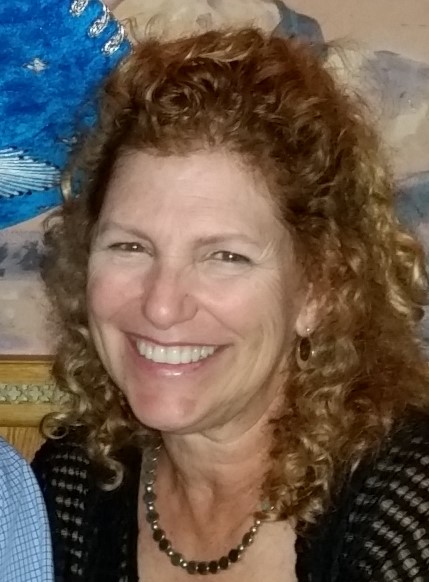
Lisi Green Marcus
FORUM ON FAITH
My Passover of Faith.
by Lisi Green Marcus
Published: April 18, 2020
Danbury News Times
Spring has sprung! Unfortunately, with it along came COVID-19, an uninvited guest that has wreaked havoc with our world, country, small and large communities and our family dynamics. The new terms "social distancing", "zooming" and "distance learning" have not crept but leaped into our vernacular.
As my family and synagogue community celebrated Passover last week (of course by Zoom) our thoughts turned to the importance of the Passover message which is to remember the Israelites fleeing ancient Egypt and slavery on their journey to freedom. The words in the Haggadah, the book we use to retell the Passover story, remind us of liberation from bondage. We should never forget our history remembering our ancestors who struggled to be free and those who still struggle to be free; refugees from around the world.
It is times like these which we are living through that make us question our faith. Why? Why now? Why us? How did we get here? Where is God?
These are all poignant questions when directed to the religious leaders who are trying to answer them. As we struggle to survive during this new "normal", I am questioning my core beliefs and I am wondering if there really is a merciful and benevolent God. "God, are you listening to my prayers?" My personal faith relies on the basic tenants that as Jews we pray to remember, reflect and to hope.
Observant Jews recite the Shema twice a day at the evening and morning service. It is based on Deut 6:7 "when you lie down and when you rise up". In English we say, Shema Yisrael. Here O Israel, the Lord is our God, the Lord is one. This is considered the most important Jewish prayer and the essence of Judaism: to love and obey one God. So, is God listening to us now during this Pandemic? Just as we Jews faced hardships when escaping Pharaoh's armies, while the Egyptians were facing 10 plaques, civilization today is facing a modern plague, the coronavirus.
In the days ahead, despite the isolation, the loneliness, the fear and uncertainty, we remember Spring is the time of renewal, rebirth and hope. I am hopeful we can use this time to reflect and emerge with new values for our families and ourselves, recognizing that the time spent together is a respite from running ourselves ragged with the business of our former schedules. We are vulnerable yet this is an opportunity for us to re-examine, evaluate and reset our priorities.
As Jewish people say at the end of their family Seders "Next year in Jerusalem"; let us hope in 2021 at our Passover Seders we can be together in the same room, hugging and kissing, eating a festival meal, welcoming strangers to our table, and sharing our thanks and appreciation for good health, freedom and belief in one God.
I would like to share a final thought connected with COVID-19 and the Passover Seder. Near the beginning of the Seder we are asked to wash our hands as part of the service. When we do this we are cleaning not only our hands prior to eating, but washing away the impurities of our daily life. I especially like this poem as it captures the connection of this act, Passover and the current world situation.
As I take up my hands,
To wash them and reassure my heart,
I pray for healing and wholeness for the whole world.
I remember that every life, is unique and of infinite value:
From those living on the most remote part of the globe,
To those in our cities to our neighbors and family members.
Let me use my hands for good to help bring,
Love and compassion to others.
"Let us lift up our hearts and hands to the Eternal." (Lam 3:41)
Lisi Green Marcus, President, United Jewish Center, Danbury. president@unitedjewishcenter.org.
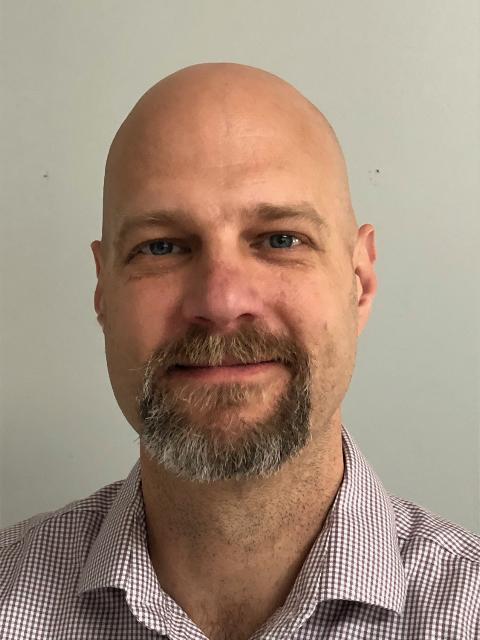
Pastor Chuck Bonadies
FORUM ON FAITH
The story of the Bible resonates with us.
by Pastor Chuck Bonadies
Published: April 4, 2020
Danbury News Times
Everybody loves a good story . . . including God.
Whether we're discussing "The Shawshank Redemption," "The Lion King," or "The Wizard of Oz," most good stories contain a similar arc: things are good, things go bad, things get fixed, and things are resolved.
Nothing new here. It's just the basic structure of literature and film. These four movements are told or implied in just about any story. It would be a challenge to find a narrative that doesn't follow that outline.
What about the Lion King? Things are good; Mufasa is on the throne. Then things are bad: he dies, and Simba is sent into exile. Then things get fixed: Simba finds himself and comes back to claim his rightful kingship. At the end, things are resolved: light comes, and darkness is dispelled. Some kind of resolution is taking place.
Or what about Dorothy? Things are good in Kansas. Then things go bad, and a tornado lands Dorothy in Oz, ruled by the Wicked Witch of the North. Dorothy fixes things and discovers that "There's no place like home." At the end, things are resolved and she is back home in Kansas.
And we can't isolate just one part from the whole, you have to know the whole story. You can't just pick up the narrative with Dorothy skipping down the yellow brick road with her three new friends. You have to take that part in light of the whole story being presented.
The plot line of the Christian Bible contains these same four movements. Christian theologians refer to them as Creation, Fall, Redemption and Restoration. Put another way, the meta-narrative of the Bible is the archetypical story upon which all others are patterned.
In the first book of the Bible, Genesis, God creates the world and everything in it. He declares that it was "very good." All that God created - people, animals, plants, the ecosystem - moved in a harmonious way with their God - given design. In particular, people walked with God and demonstrated love for one another. But this blessing would be short-lived.
Things go wrong. The Fall refers to the original sin and the terrible consequences that follow. Because of their transgression, Adam and Eve were forced out of the Garden and into a creation now marred by evil and suffering. People turned inward, towards selfishness. The subsequent narratives remind the reader of the extent of the violence and darkness that now covers the world.
But all is not lost! God makes a promise that a Messiah will redeem the world from ruin. This promise of Redemption is gradually revealed though the Old Testament prophets and Israel. The hero of the story, Jesus, emerges in New Testament where He dies on a cross and is raised from the dead. Most importantly, His resurrection marks the beginning of the final movement of The Story, "Restoration."
In the final two chapters of the Bible, Jesus shares a vision of a renewed creation and a restored humanity. The Messiah eradicates evil and suffering, wipes away the tears from every eye, and announces, "I make all things new." Christians understand this to mean that, someday, Jesus will make all the wrongs of the world right again.
Interestingly, this future world that Jesus describes is quite similar to the original creation, in particular, the Garden of Eden. Both Eden and the New Jerusalem are elevated locations, a glorious river runs through the center of each, and they both contain a Tree of Life.
The Resolution of the story is that all that was lost in Eden will be restored in the world to come. In the narrative of the Christian story, God takes his creation from Baltic Avenue to Park Place.
Why are we so enamored by good stories? Why does that general plotline resonate so deeply with people? J.R.R. Tolkien, the author of "The Lord of the Rings," wrote some essays that may give us something to consider.
The stories we enjoy in our everyday lives resonate with us, he said, because this is the dynamic structure of the Great Story that God has written into the universe. Perhaps that is what C.S. Lewis meant when he said, "If I find in myself desires which nothing in this world can satisfy, the only logical explanation is that I was made for another world."
Pastor Chuck Bonadies, Ridgefield Baptist Church, ridgefieldpastor@gmail.com.
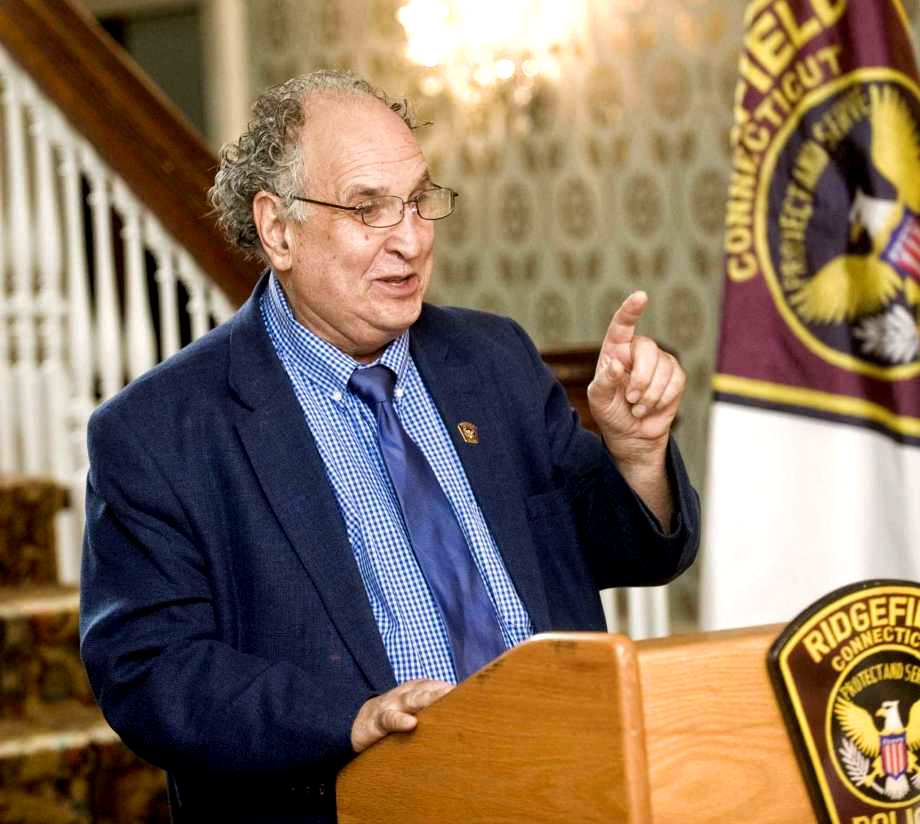
Rabbi Jon Haddon
FORUM ON FAITH
Passover, Jews eat matzo to remember God's kindness.
by Rabbi Jon Haddon
Published: March 21, 2020
Danbury News Times
The Jewish holiday of Passover begins at sundown on Wednesday, April 8.
Whenever it comes around I think of the holiday and its rituals. For thousands of years Jews have marked the event of the exodus from Egypt with a meal called the Seder. Unleavened bread, called matzah, is eaten. This food was eaten during the exodus from Egypt. By eating matzah Jews remember God's kindness.
Although finding and eating matzah is simple today, it has not always been so easy. Let me share this story I learned from Rabbi Eli Hecht, who learned from his teachers who were World War II Holocaust survivors.
Far away in Slovakia the Passover Seder was celebrated in a most humble fashion. Simcha Bunem Unsdorfer had been brought to the Auschwitz death camp. There the SS officers killed thousands of men, women and children daily. Simcha knew that there were only two ways to leave the death camp. One was through the chimney of the ovens after being gassed and burned. A better way was to find work for the German war effort.
One day a rumor was spread. The German military factories were bombed and new parts for guns and airplanes were needed. The Germans built factories in hidden areas. They used Jews to run their factories and literally worked them to death. Replacements for the poor workers were the men found in the death camps who were strong enough to work.
One such camp, "Nieder-Orschel," was established to produce parts for building wings for the Luftwaffe's fighter aircraft. Simcha and some Slovakian Jews were taken from Auschwitz to this camp. The men were forced to work 18-hour shifts and were given barely enough food to survive. The food rations were terrible but the lice and diseases were worse. Imagine wearing the same clothing for months. As bad as it was, the men felt that this was infinitely better than being gassed and burned in the crematoriums.
When the Passover season came the men gathered around and spoke of their need to have Passover matzah. In the Nieder-Orschel factory there were workers who were not prisoners. They were civilian workers who went home nightly.
Simcha had made friends with one Christian known as Meister Meyer, a civilized worker. "I need a 1/2 pound of flour," said Simcha to Meister Meyer. "What? Have you lost your mind?" exclaimed Meyer. "What do you need the flour for?" "The holiday of Passover is here and I need to bake matzah," answered Simcha. Meister Meyer muttered to himself, "How can Jews think of matzah when their God has forsaken them to the death camps?"
Since Simcha was very determined to have his way, Meister Meyer brought him a little bag of flour. "We shall not see each other any more. Here is the flour. May your God protect you." That night Simcha and a few friends sneaked out of the barracks and went into the smithy's shop. They worked feverishly with the bellows until they got a small fire going. Finding a small, dirty tin plate, they cleaned it as best as possible and used it as a platter. In a half hour three tiny, round matzah were ready.
That night, March 28, 1945, the small group held their Seder. They couldn't find anything as satisfying in their lives as eating the small matzahs in this godforsaken death camp. Simcha survived the death camp and shared his experience in a personal memoir called The Yellow Star.
Before the Nazi occupation Shimon Cohen was the head baker of his city. Shimon wanted to provide the Jews with matzah. A few days before the holiday Shimon organized a group of young men and asked them if they were willing to give up their lives for the performance of a mitzvah, the commandment, to bake matzah. In great secrecy they bartered old clothes for flour.
They sneaked into an old bakery and heated up the oven to bake matzah. Forgetting the grave danger surrounding him and his friends, Shimon became so excited with the baking that he began to sing. His soul felt like bursting. He sang louder and louder. "As the Israelites went out of Egypt," went the song.
Suddenly a shout was heard. The door of the bakery was smashed down. In entered the Gestapo leader. "Cursed Jews, what's happening here?"
Before they could answer, the Gestapo officers swung their batons and rifles onto the heads of the defenseless Jews. "Your singing gave you away. Your fate is sealed. We will put you against the bakery wall and shoot you!"
Shimon, the initiator of the baking said, "You cannot frighten me. Tomorrow is the Jewish holiday of Passover and I was baking matzah in honor of the holiday."
The commander began screaming like an animal in pain, "Typical Jewish audacity, you will be killed by us. We will not kill you by bullets, as we don't want to waste the bullets. Rather, we will club you to death." A group of sneering Nazi Gestapo men descended on poor Shimon and beat him mercilessly, killing him.
That night the Seder was held in the poor Jewish homes in the ghetto but there was no matzah to be found. Little innocent children gathered the bits of the matzah left in the bakery for the Seder meal. They wanted to prove to themselves that nothing would stop their belief in God. The little matzah bits were displayed on the Seder table to symbolize the ritual matzah.
Yes, Shimon Cohen had died a hero's death. The ghetto remembered his heroism for a long time. They called him "the modern day Paschal sacrifice."
This message is for all the people on Earth, as there is no monopoly on the spirit of life. The holiday of Passover is a lesson to all nations of the world. We all may be exposed to evil people but we don't have to become like them. We can liberate ourselves by remembering our divine spirit and experience freedom.
Rabbi Jon Haddon lives in Danbury and is Rabbi Emeritus, Congregation Shir Shalom of Westchester and Fairfield Counties, Ridgefield. He can be reached at mailto:jonrab33@gmail.com.

Polly Castor
FORUM ON FAITH
Considering coronavirus, fear and God.
by Polly Castor
Published: March 7, 2020
Danbury News Times
While our hearts cry out for all those who have been so unnecessarily brought down by the coronavirus, I want to acknowledge here that I do not believe that this whole thing is God's will. That is why it is so devastating to stand by and observe it.
Psalm 91, which is so reassuring in general, has this one disturbing verse embedded in it, "A thousand shall fall at thy side, and ten thousand at thy right hand; but it shall not come nigh thee." Good news for us it seems, but why not for everyone?
God tells Job regarding a "proud wave," thus far ... and no farther." Jesus' only civil words to Satan were, "Get thee hence." It seems to me that this coronavirus is unGodlike hubris, which God is perfectly capable of stopping in its tracks.
Lets look at some of the more comforting verses in that 91st Psalm. Mentally and prayerfully, we can "dwell in the secret place of the most High," and "under the shadow of the Almighty," where nothing scary can reach us. God can be our "refuge and fortress," strong and trustworthy, "our very present help in trouble."
That Psalm also says that God will deliver us from the "snare" and from the "pestilence." I find it a relief to hear that as a promise that we will not be trapped by this disease.
It goes on to say we shall be protected under God's "wings" and nestled in gentle feathers. I love that image of being tucked up under God's wing, all cozy and safe, comfortable and cared for in those soft, downy feathers.
The psalm implies that here is no fear or threat there. There, we have immunity not only to disease, but to anything unlike good. There, not only are we healed, we're guarded and unassailable.
The foundation of any pandemic is fear. In Christian Science we learn that fear is also a major cause of disease. Fear is rarely good for us, and we recommend removing fear, instead of inciting it.
So it is not surprising that in Psalm 91, to read that "we shall not be afraid by the terror by night ... nor for the destruction that wasteth at noonday," while it explains God as our shield and defense. The Bible also declares, "Perfect Love casts out fear," and that, "God is Love."
God, as infinite Love, surrounds and enfolds each one of us; we cannot get outside of it; there is nowhere else to go. We literally live, move, breathe and have our being in God, the atmosphere of divine Love. Therefore, Christian Scientists reason that there can be no contagion of anything but good in God's all-powerful presence, and we seek to establish ourselves there.
Returning to Psalm 91 we read, "Because you have made the Lord, which is my refuge, even the most High, thy habitation; there shall be no evil befall thee, neither shall any plague come nigh thy dwelling. For he shall give his angels charge over thee, to keep thee in all thy ways."
Further in that psalm, we are told those angels will protect us, and not even let us stub our toes. We are assured we'll be invincible against frightening things and even "trample" them under our feet, subduing them with our God given dominion. We are reminded that we can call upon God in our trouble.
So I don't know why we are in this mess, but I believe there is a way out of it. I think we need to calm our thought, and turn to God, full of love and trust, expecting to receive defense, preservation, and tender care. I believe God is large and in charge, and that disease is not.
When knowing this, we'll have the poise needed to clearly hear those angels directing us out of harm's way. We'll have the unruffled obedience to respond correctly. We'll have the equanimity to know what we need to do or not do.
Meanwhile, we can abide under God's wing, feeling safely hidden in the refuge of those wonderfully fluffy feathers, convinced that there is no reason to fear, where infinite, all-powerful Love, God, is present.
by Polly Castor, a Christian Science Practitioner, and member of First Church of Christ, Scientist, Ridgefield, CT. She can be reached at PollyCastor@gmail.com.
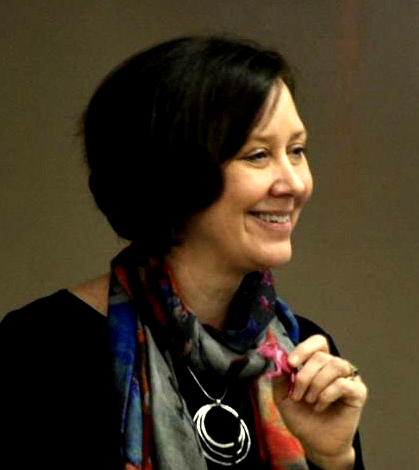
Rev. Deborah Rundlett
FORUM ON FAITH
We need to make whole what is broken.
by Rev. Deborah Rundlett
Published: February 15, 2020
Danbury News Times
I have been thinking a lot about wounds lately. Not the kind you see on the outside, rather the deep-inside kind. At the same time, I am reminded of one of the central paradoxes of my understanding of the Christian faith: Out of brokenness comes wholeness.
Pat Conroy reflects on this paradox in his autobiography, "The princess of the Tides:" "My wound is my geography. It is also my anchorage, my port of call."
He was speaking of growing up in an abusive household. Yet, through his writing, Conroy allowed his wounds to become a source of life, inspiration and hope. He found the soul of integrity in his writing and life journey.
Wounds are born of many different kinds of trauma.
The wounds of with-holdings: that is, not getting what we need to be whole and healthy.
The wounds of aggression: receiving what we did not need in the form of physical abuse.
The wounds of loss in the form death, illness and/or accident.
The wounds of betrayal born of emotional abuse and manipulation.
The wounds of prolonged duress, as experienced in war, natural disaster and situations of chronic stress.
Our present political divide, the gun violence, the economic inequality, the increasing violence against those who are a different color and/or sexual orientation can seed the wounds born of trauma.
Daily there is relational fallout. Like aftershocks, social media can increase fear and spreads distrust.
All the while, the fault lines are growing as we continue to respond with incremental "fixes" to circumstances that can only be addressed by reclaiming the soul of our integrity.
If geography is the study of the earth, then our wounds are the study of traumas that have shaped and formed us.
If we trace the geography of our wounds, they can become for us a source of integrity, depth and even hope. It is then that we come to experience the paradoxical reality that true wholeness is born out of brokenness.
In our vulnerability, many of us prefer cut-off. We ignore our wounds at great peril to self and community. Our wounds become an underground source of disruptive emotions and dysfunctional behaviors.
Our response is to ever-focus on behaviors and emotions - sometimes our own, more often that of others - trying to fix, rather than address the root wound.
Often our need for hearing is revealed in an unhealthy responses to a life situation. When there are unhealed wounds, we may respond with dysfunctional behavior and emotional upheaval rooted in false belief. We may stay on the surface, never digging beneath the false belief.
But, as poet Jan Richardson reminds: "Somewhere beneath our hungers are maps ... there is a geography to our desires ... our yearnings possess longitude and latitude... of we follow their lines, they can help us find our way."
Naming our root wounds is important.
With the naming, comes release to experience truth and acceptance comes peace and empowered living. Just as Pat Conway's wounds provided deep inspiration for his writing, so our wounds can and will provide inspiration for our lives.
In a time when many superficial voices speak, those who dare articulate the pain of the wounds intuit a way forward that offers healing and wholeness not just on an individual level, but also on a family, community and societal level.
If indeed, a large portion of our anxiety is tied to systemic challenges, then I believe they must be addressed systematically, beginning at the level of self.
And I believe that begins with letting go.
Letting go of our sense of how things should be. Letting go of our desire for a carefully ordered existence. Letting go in order to take hold of the emergent new.
As Professor Bob Quinn reminds: "Our ability to change is predicted on our ability to let go.
Deep down, we know that we all have wounds in need of healing. Put another way, we all got stuff. I got stuff. You got stuff.
How might our stuff serve as our port of call toward the flourishing of our communities? How might we reclaim our agency? Not in spite of the trauma, but through claiming the wholeness born of our brokenness. Therein lies the paradoxical gift.
Rev. Deborah Rundlett is a pastor at Ridgebury Congregational Church.
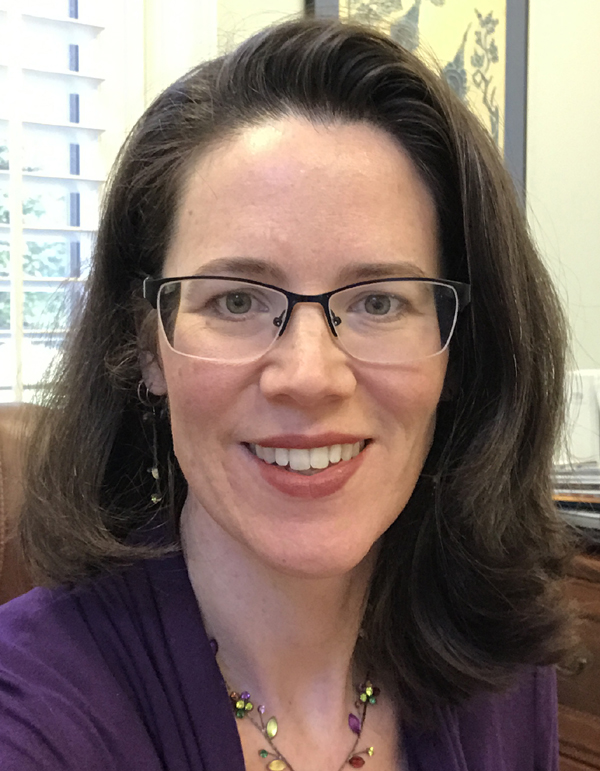
Shannon Cobb
FORUM ON FAITH
Charity is the best gift you can give yourself.
by Shannon Cobb
Published: February 1, 2020
Danbury News Times
On my desk at work sits a Jewish Tzedakah Box which I cherish. It belonged to Barbara Roos, one of the volunteers at Ann's Place who passed away after a battle with cancer.
Barbara came into the office one day a couple of years ago with a handful of change and proudly told me about Tzedakah - which I learned means "justice" or "righteousness" - and the box which is used for collecting coins for charity. It is one of many ways Judaism promotes helping others as a central tenant of the faith.
I am not Jewish, but I have spent over 25 years in the nonprofit sector observing charity and volunteering from people of all faiths including my own. What I have learned is that the act of giving back is incredibly healing and one of the most powerful tools God gave us for living a full and joyful life . . . even in really difficult times.
I have worked with many charities addressing tough issues - advocating for abused and neglected children, assisting homebound seniors, and now, supporting people facing cancer. In every job, I have had to answer the question from someone looking in, "How do you do that and stay strong?"
I don't feel particularly strong. But everywhere I have worked, God has placed people around me who keep me strong through their actions. These are often small acts kindness - like a nine year-old who happily hands me funds from cookies she sold, a yoga teacher who joyfully donates a weekly class to our families, a group of students at Brewster High School who volunteer to do our laundry, and to the donors who surprise me by writing a thank you note with their check.
These small acts are the foundation of my strength. Not just because I am surrounded by helpers, but because I get to share the incredible sense of joy the helpers feel when giving back.
There is a mom-daughter team who each year donates an elaborate holiday meal to a family facing cancer. They do it in memory of their husband and father who they lost to cancer not long ago. This act was part of their healing process and through it, they were able to claim back some of the joy they lost when he died.
Even when times are really hard, God gives us healing through service. Anyone who has spent a day volunteering knows the euphoria it gives. The science behind what is frequently called the "helpers high" is well documented. The chemistry in our bodies actually changes when we volunteer. How amazing is it that God built it into our very fabric - to receive a sense of joy when giving to others!
The nonprofit sector in our community may have been created to care for people in need, but I would argue that our entire community heals and is transformed far more because there are places and systems which allow us to give back and to connect to others who need us.
While mass media insists on focusing on our differences, charities exist to bring us together to connect and care for one another. A friend once told me that "social work" is two words because it is the art of bringing diverse people together to be social, but it takes a lot of work to make it happen!
When I met Barbara during my first week at Ann's Place, she held my hand and didn't let go until she learned my name, where I came from, and my family history. She looked me right in the eyes and for a few minutes of (slightly awkward) hand holding in the hallway, I knew I was her whole world. What a simple gift to give me, and yet so powerful.
I believe it is in these moments, when we give ourselves over to another person, when we are fully present for them, that we are closest to feeling God's love for us. As such, giving to others is one of the most important things we can do for ourselves and our faith journey.
What gifts of charity will you give yourself today?
Shannon Cobb is President and CEO of Ann's Place and a member of Jesse Lee United Methodist Church. She can be reached at, 203-790-6568 or shannon@annsplace.org.
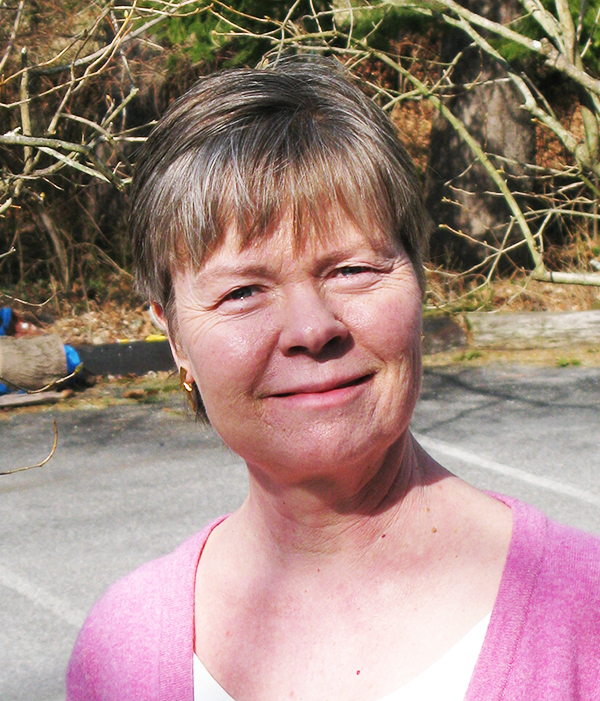
Rev. Lori Miller
FORUM ON FAITH
Epiphany in Newtown and the world.
by Rev. Lori Miller
Published: January 18, 2020
Danbury News Times
The United Methodist Church joins much of the Christian world in celebrating the season of Epiphany during January.
The Epiphany itself is January 6, which commemorates the visit of the Magi to the Christ child, a chapter of the Christmas story told in Matthew's gospel.
Because that story revolves around a bright star that let the wise men to Jesus, the season of Epiphany, which continues until the beginning of Lent, revolves around the theme of light.
It also lifts up the appearing of God in human form, in the person of Jesus, whom we believe is the power and the love of God in the flesh.
Just as we use the word epiphany to talk about a sudden revelation or new way of seeing, the season of Epiphany marks the new ways of seeing or understanding that can come forth in the light of God's love.
Perhaps it is ironic that at a time of year when we struggle with still-short days and long, cold nights, light would be such an important concept - or maybe it makes perfect sense.
At a meeting at our church last month, the chair of the committee began, as he typically does, with a devotional.
After Duane had shared what we thought was the end of the reading, he paused to ask a question: Did any of us see anything unusual in the room?
Those of us present looked around us, scanning the parlor for something strange on the walls, the table - each other.
But nothing looked different
Then Duane got up and turned off the lights.
From underneath one of the chairs a light glower. We realized then that there had been a lit flashlight there the whole time Duane was talking, but none of us had noticed.
Its little light was drowned out, made invisible, by the much brighter lights in the ceiling. It was only in the darkened room that the light of that single bulb could be seen.
In the darkness, it was about the only thing visible.
In our human life it sometimes feels as though we are confronted by difficult issues that throw a pall over us. In our personal lives we face illness, loss, joblessness, distress in the life of someone we love.
In our community life we face more systemic issues: poverty, gun violence, deep prejudices and divisions in a society that seemingly becomes more polarized each day
As I write this column, the media has just broken the story of a probable split in the United Methodist Church over the full inclusion of our LGBTQ brothers and sisters.
Many in our church claim Dr. King's belief that any injustice is a threat to everyone, and it needs to be illuminated and erased.
Uncertainty itself is a veil that often feels like darkness, and many people beyond us Methodists feel the uncertainty of a society in the midst of great change.
As caring people, we want to face down any ill or evil that blankets human life. If we are people of faith, we trust that God calls us to live in the light of God's grace and power . . . and yet we may wonder, what can we do?
At Newtown United Methodist Church, we will sing the old song "This Little Light of Mine" during Epiphany. In the song we affirm that we have a light, and we believe this light comes from the light of God in Jesus Christ.
But like the flashlight hidden under the chair, we may not fully see what's in that song: "This little light of mine" is what we sing. Not "This gigantic light of mine" or "This powerful light of mine." We acknowledge that our light is little.
But we still let it shine.
As United Methodist Christians we believe we are beacons of God's love in this world. Sometimes the issues we face, individually or collectively, seen very big and our own strength and resources very small.
We may not feel up to the task before us.
But it is exactly in those times, we believe, that God provides the power we need to shine,
No matter what the circumstances, there is always something we can do on the side of right, of justice, of love. No step is to small, no light is to little, we believe, to not make a difference in the lives of God's children.
The Rev. Lori Miller is the pastor at Newtown United Methodist Church and can be contacted at lori.miller@nyac-umac.com.
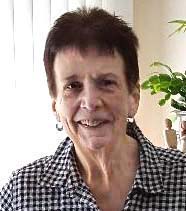
Jo Gabriele
FORUM ON FAITH
Making resolutions with God in mind.
by Jo Gabriele
Published: January 4, 2020
Danbury News Times
We have turned the page, not only on a new year but a new decade. For me, it is a time of reflection, a time for planning and a time of commitment.
In years past as the New Year loomed, I made the all too familiar resolutions; you know, the ones many of us make: I am going to eat healthier, I am going to exercise more, i am going to get in shape.
But another year passes and the cycle just seems to repeat itself.
This year, my decision was to use a new approach to define my resolutions for 2020. I was inspired by the topic of a message delivered by one of my fellow congregants at a mid-week recharge service. His message was based on a question. "What Does God Want?" so to prepare my 2020 resolutions I asked myself, "What Does God Want of Me?"
As a lifelong Christian, I turned to the Bible and Mark 12:30-32 for the answer.
Jesus explains God's two greatest commandments: "And you shall love the Lord your God with all your heart and with all your soul and with all your mind and with all your strength."
The second is this: "You shall love your neighbor as yourself."
So, how does the everyday person do that? Well, certainly worshipping on a regular basis is a good starting point or working with your church family on initiatives to improve the lives of individuals and families in the community, but it goes beyond that.
As a Christian I have learned that a church is not the building where we go to worship on Sundays. Each one of us needs to be the church and there are many ways to do that, the most obvious being to share the good word; but what about our deeds?
One thing I have noticed to be prevalent in society today is that we do not see each other as "people" anymore, instead, we have the tendency to assign labels, i.e., he is a Democrat, she is a Republican, he is homeless, she is disabled, he is Muslim, she is Jewish, they are illegal immigrants.
How am I supposed to love my neighbor as myself if I do not first see my neighbor s my equal.
So now I turn to the words found in Matthew 7:1, "Judge not lest ye be judged," and these words served as the foundation for my 2020 resolutions.
1. See every person I encounter as human being without assigning a label.
2. Never underestimate the power of a simple smile whenever you encounter anyone. I can almost hear my mother now: "You get more with honey that you do with vinegar."
3. Never underestimate the value of a random act of kindness, especially to a stranger.
4. If someone needs to talk, I will listen; if they need to cry, I will comfort them; if they need the healing hand of God, I will pray with them; and if they just need to sit in silence, I will sit with them.
5. I do not have to agree with everyone's point of view, but I do have to respect their right to have it.
6. When interacting with individuals with a disability, instead of seeing them as disabled, I will search for the light that lives within them.
7. Always remember to "pay it forward."
I am grateful for the blessings bestowed on me throughout my life. I grew up in a large family and was raised to honor God, cherish family and extend a hand to neighbor in need. As a kid, your neighbor meant the people who lived on the block. As an adult, my neighbor needs to be anyone I encounter.
We only get to travel this mortal life once, and while I cannot make a difference to a world of people, I can make a difference to some and that's what I truly believe God wants of me.
I am happy with my resolutions because in the end, the benefit extends beyond myself; and when the day comes when my mortal life ends and my eternal life begins, I hope that someone will pick up where I left off to write the next chapter in the book of life and continues to pay it forward.
Jo Gabriele is a member of the Bethel United Methodist Church and can be contacted at jogabriele@sbcglobal.net.